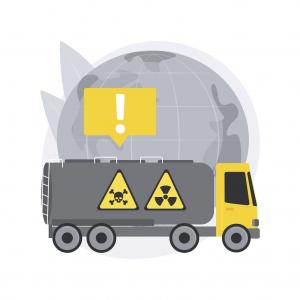
Did you know that you are surrounded by goods that are classified dangerous? On their own they may present little danger but when transported in quantity there are regulations in place to protect the safety of anyone handling and transporting the goods. We offer a diverse range of Dangerous Goods training, the courses can be sat online (e-learning) or in a virtual classroom’
What are Dangerous Goods?
Dangerous goods are any items or substances which, if not handled or packed properly, could pose a risk to health, safety, property or the environment.
What kind of goods are considered dangerous?
Some goods that are classified as hazardous materials may surprise you, such as aerosols, perfume or anything containing lithium batteries – like mobile phones or laptops.
There are nine classes of dangerous goods, and knowing which one your item falls under will give you a clearer picture of how to pack, label and transport it.
What are the nine classes of dangerous goods?
- Explosive substances and articles: Like fireworks, flares, airbag modules or seatbelt pretensioners
- Gases:
- Flammable gas: Like camping gas or aerosols such as spray deodorant, spray paint, hairspray and whipped cream in a spray can
- Non-flammable gas: Like compressed oxygen, nitrous oxide (laughing gas) or compressed carbon dioxide cylinders for carbonating water
- Toxic gas: Like bug spray or oxygen difluoride
- Flammable liquids: Like solvents, paints, nail polish or nail polish remover
- Flammable solids: Like matches
- Oxidising substances & Organic peroxides: Like fertiliser and like hydrogen peroxide for bleaching hair, two-component adhesives (glue) or fibreglass repair kits
- Toxic & Infectious substances: Like pesticides (both solid and liquid forms) and like blood tests, tissue samples, cell samples or biopsies used in medical trials
- Radioactive materials: Like smoke detectors or medical isotopes
- Corrosive substances: Like bleach or drain cleaner
- Miscellaneous: Like magnets, lithium batteries or dry ice

If articles or substances are shipped without having the hazard declared this is called Undeclared Dangerous Goods. This opens your organisation up to penalties and for continued shipments a journey through the court system for larger penalties and potential custodial sentences.
With an estimated 10% of the 60 billion containers being shipped globally labelled as mis-declared or undeclared Dangerous Goods; Shipping Lines and Airlines are starting to increase penalties.
Current fines are unlimited in the UK but if there has been an incident involving your goods, you may also have to pay for the repair of the property (truck, aircraft or cargo vessel), the environmental clean-up and cover the cost of the damage to others. This could also cause long term damage to your business reputation.
Each mode of transport, (air, sea, road, rail and inland waterway) has its own regulations. The UN sub-committees for each mode have identified which articles and substances they are willing to transport safely and security. Helping them to mitigate their level or risk to people, property and their environmental impact.
Most businesses that handle dangerous goods recognise that keeping the supply chain safe is important and complying with the regulations is essential. To be compliant, businesses must ensure their staff have the correct validation for the class of goods they handle and the mode they are transported by.
Making some time to review procedures can help prevent problems before they arise.
Being compliant as a business in the handling of Dangerous Goods is a necessity. Ensuring that your staff have the skills and knowledge necessary to recognise potential dangerous goods that they may come into contact with in their work environment is the key to achieving it. By being familiar with the regulations, labels and hazard classes your employees can ensure that any potential dangerous goods that are found can be handled by a certified member of the team.
Fully regulated training must be untaken to be DG certified and staff need to pass a regulated test in order to receive official validation. Validation lasts for 2 years and then re-validation courses must be completed in order to retain certification - to ensure staff are up to date with any regulation changes.
How can we help?
Essex Chambers of Commerce recognise the importance of understanding Dangerous Goods and our Dangerous Goods Service is designed to work with you to provide support and updates for all manner of dangerous goods questions. Our aim is to help your business stay compliant with the regulations for all modes of transport.
There are many different ways we can support your business, offer advice and give you the peace of mind that you need to feel confident with transporting dangerous goods.
TRAINING: We have a huge range of training courses, delivered in various formats, to provide businesses with the knowledge they need, from basic awareness training that all staff can undertake to the fully regulated and re-validation training.
We have an exclusive range of E-learning courses are perfect for those who have limited free time or need to take training at their own pace and all courses are IATA, IMDG & ADR approved.
Virtual Classroom
Our virtual classrooms are for small groups of no more than 8 attendees. Training is delivered by a qualified instructor and attendees receive a learner pack complete with all the resources required to successfully complete their exams.
In-House Training
Training can be delivered at our premises by a qualified instructor. All the resources required are provided to complete the training. The costing for this is based on the location, number of employees and training required.
Download our Brochure to find out more!
We work hard to ensure that our customers feel confident that they can execute what they have learned. We will always offer to help coach the transition to the work environment.
ADVICE: Our experienced advisor is on hand to answer your questions and help you on the best action to take to ensure you are compliant with today’s regulations. This could include anything from short discussions on your working methods and training certificates you need to hold - to a full Dangerous Goods Facility Audit, or even the completion of your annual or audit reports for your Dangerous Goods.
We are here to support businesses to stay in front of the regulations as the world of logistics, shipping and dangerous goods changes. Compliance is the key to controlled and effective supply chains.
Contact us to find out more.





